Just Like Heaven
Book 1 in the
Smythe-Smith Quartet
A) a really bad violinist
B) still miffed at being nicknamed “Bug” as a child
C) NOT in love with her older brother’s best friend
D) all of the above
Marcus Holroyd is:
A) the Earl of Chatteris
B) regrettably prone to sprained ankles
C) NOT in love with his best friend’s younger sister
D) all of the above
Together they:
A) eat quite a bit of chocolate cake
B) survive a deadly fever AND world’s worst musical performance
C) fall quite desperately in love
And it’s JQ at her best, so you KNOW the answer is…
D) all of the above
From #1 New York Times bestselling author, and creator of the Bridgerton series, Julia Quinn presents the first, dazzling installment in the Bridgerton adjacent Regency era–set world featuring the romantic exploits of the well-meaning but less-than-accomplished Smythe-Smith musicians. In this case, a beautiful violinist in the pitiful group who has her sights set on marrying the last unwed Bridgerton…unless her handsome, lovestruck guardian has anything to say about it. Bridgerton fans will cry, “Encore!”
 Start Reading Now
Start Reading Now
 Explore Inside this Story
Explore Inside this Story

Books in this series:
Find out more about the Smythe-Smith Quartet →
-
-
Quinn-tessential Quote
The Smythe-Smith musicale. It finished off what the Crusades had begun.
-

Inside the Story:
JQ’s Author Notes- Writing Just Like Heaven took a lot of research. Not of history or of music, but rather of my own novels. I had included Smythe-Smith characters in so many books that I had to take several days just to compile all of my previous mentions. Once I did that, I had to decide which set of Smythe-Smith cousins I was going to write about. I discovered that I had written about musicales taking place in 1816, 1819, 1824, and 1825. I settled on the girls from 1824/1825, in part because I wanted to be able to spread the quartet of books over two seasons.
- Families and family relationships are very important in my writing, so when I develop characters for a book I have to understand their family structure. This meant I had to figure out how many brothers and sisters each character had and where they were in the birth order. Because the Smythe-Smiths are such a large family, I had to come up with eight separate nuclear families. To do this I had to recreate nineteen years of Smythe-Smith quartets. Yes, you read that right. Nineteen years of them! If for some reason I ever need to know who played the viola in 1815, I've got the info at my fingertips. (Literally, since I do have to type to pull up my computer files.)
- I desc
 ribed Honoria's preferred shade of pink as "primrose." Imagine my horror when I read that the lovely yellow dress Queen Elizabeth wore to the Duke and Duchess of Cambridge's wedding is being described as "primrose yellow." I maintain that primroses come in many hues. (P.S. I thought the Queen looked lovely. Mrs. Middleton, too.)
ribed Honoria's preferred shade of pink as "primrose." Imagine my horror when I read that the lovely yellow dress Queen Elizabeth wore to the Duke and Duchess of Cambridge's wedding is being described as "primrose yellow." I maintain that primroses come in many hues. (P.S. I thought the Queen looked lovely. Mrs. Middleton, too.) - My husband is a physician, specializing in infectious diseases, so naturally I asked him to look over the scene when Marcus is so ill. After I read it to him, he paused for a moment, then said, "He has to die." I said, "Perhaps you don't understand how this works." In the end, I modified the scene to make Marcus's wound a bit less infected.
- I'm actually not that crazy about the name Honoria and probably would not have used it for a heroine except that I had already mentioned her in a Lady Whistledown column in Romancing Mr. Bridgerton. There was no way I could resist a scene in which Lady Danbury destroys a violin!
- Miss Butterworth and the Mad Baron rides again! My favorite novel-within-a-novel first appeared in It's in His Kiss, then came back in What Happens in London and Ten Things I Love About You. And now my sister Violet Charles and I have adapted it as a graphic novel!
- All of the books Honoria brings Marcus during his convalescence are real. Except Butterworth, of course.
- Mozart's Piano Quartet, No. 1 is indeed thought to be an extremely difficult piece and the Smythe-Smiths absolutely should not have attempted it. Then again, Mozart also wrote "Twinkle Twinkle Little Star," and they probably should not attempt that, either.

Bonus Features
Enjoy an Excerpt
from
Just Like Heaven
Prologue
Marcus Holroyd was always alone.
His mother died when he was four, but this had surprisingly little effect on his life. The Countess of Chatteris mothered her son the way her mother had mothered her children–from afar. She was not irresponsible; she took great care and pride in finding the very best baby nurse for her husband’s new heir. Miss Pimm was on the darker side of fifty and had already cared for two ducal heirs and a viscount. Lady Chatteris placed her baby into Pimm’s arms, reminded the nurse that the earl could not tolerate strawberries and thus it was likely that the baby could not either, and then left to enjoy the London season.
At the time of her death, Marcus had seen his mother on precisely seven occasions.
Lord Chatteris was more fond of country life than his wife and was more frequently in residence at Fensmore, the great big rambling Tudor house in northern Cambridgeshire that had been home to the Holroyds for generations. But he fathered his son the way his father had fathered him. Which was to say that other than making sure the child was put atop a horse at the age of three, he didn’t see any reason to bother with him until the boy was old enough to conduct a reasonably intelligent conversation.
The earl did not wish to remarry, even though he was warned that he ought to get himself a spare to go along with his heir. He looked at Marcus and saw a boy of good intelligence, excellent athleticism, and passable looks. Most importantly, he was as healthy as a horse. With no cause to suppose that Marcus might kick up and die, the earl saw no reason to subject himself to another round of wife-hunting, or even worse, another wife. He chose instead to invest in his son.
Marcus had the best tutors. He was schooled in every possible corner of a gentleman’s education. He could name all the local fauna and flora. He could ride like he’d been born to a saddle, and if his fencing and shooting wasn’t going to win any competitions, he was still well above average. He could do lengthy products and sums without even a drop of wasted ink. He could read Latin and Greek.
By the age of twelve.
Which was, perhaps coincidentally, about the age his father decided he might be able to carry on a decent conversation.
It was also the age at which his father decided that Marcus must take the next step in his education, which was to leave Fensmore and attend Eton College, where all Holroyd boys began their formal educations. This turned out to be the most fortuitous and happy circumstance of the young boy’s life. Because what Marcus Holroyd, heir to the Earldom of Chatteris, did not have was friends.
Not a one.
There were no appropriate boys in northern Cambridgeshire with whom Marcus might play. The closest noble family were the Crowlands, and they had only girls. The next best family was landed gentry, which would have been acceptable under the circumstances, but their sons were of entirely the wrong age. Lord Chatteris wasn’t about to have his son consorting with peasants, so he simply hired more tutors. A busy boy couldn’t be a lonely boy, and besides, no son of his could possibly want to run wild across the fields with the baker’s rowdy brood.
If the earl had asked Marcus his opinion, he might have got a different answer. But the earl saw his son once per day, just prior to the evening meal. Their interview lasted about ten minutes, then Marcus went up to the nursery and the earl to his formal dining room, and that was that.
In retrospect, it was nothing short of remarkable that Marcus was not utterly miserable at Eton. He certainly had no idea how to interact with his peers. On the first day, when all the other boys were running about like (in the words of his father’s valet, who had dropped him off) a pack of savages, Marcus stood to the side, trying not to stare, trying to look as if he meant to stand at the side, looking off in the other direction.
He did not know how to act. He did not know what to say.
But Daniel Smythe-Smith did.
Daniel Smythe-Smith, besides being the heir to the earldom of Winstead, had five siblings and thirty-two first cousins. If ever there was a boy who knew how to get on with other children, it was he. Within hours, he was the undisputed king among the youngest boys at Eton. He had a way about him–an easy smile, a happy confidence, an utter lack of shyness. He was a born leader–able to make decisions just as quickly as he made jokes.
And he was assigned to the bed directly next to Marcus’s.
They became the best of friends, and when Daniel invited Marcus home for their first holiday, he went. Daniel’s family lived at Whipple Hill, which wasn’t very far from Windsor, so it was easy for him to make frequent trips home. Marcus, on the other hand… Well, it wasn’t as if he lived all the way in Scotland, but it did take more than a day to get back to the northern reaches of Cambridgeshire. Plus, his father had never gone home for the minor holidays and saw no reason why his son should do so, either.
So when the second holiday came up, and Daniel invited Marcus again, he went.
And then again.
And again.
And again until Marcus was spending more time with the Smythe-Smiths than he did with his own family. Of course, his family consisted of exactly one person, but still, if Marcus stopped to think about it (and he did, quite frequently) he spent more time with each individual member of the Smythe-Smith family than he did with his father.
Even Honoria.
Honoria was Daniel’s youngest sister. Unlike the rest of the Smythe-Smiths, she had no siblings close to her own age. She hung off the end of the family by a good five years, a presumably happy accident to cap off Lady Winstead’s marvelous procreative career.
But five years was a large gulf, especially if one was but six years old, which was Honoria’s age when Marcus first met her. Her three oldest sisters were already married or engaged to be, and Charlotte, who was eleven, wanted nothing to do with her. Neither did Daniel, but absence must have made Honoria’s heart grow ridiculously fond, because when he was home from school, she followed him around like a puppy.
“Don’t make eye contact,” Daniel once told him as they were trying to avoid her on a hike down to the lake. “If you acknowledge her, it’s all over.”
The walked purposefully, heads forward. They were going fishing, and the last time Honoria had joined them she had dumped out all the worms.
“Daniel!” she yelled.
“Ignore her,” Daniel muttered.
“Daniel!!!!!!!!!!!!” She went from yell right to shriek.
Daniel flinched. “Faster,” he said. “If we make it to the woods she won’t find us.”
“She knows where the lake is,” Marcus felt compelled to point out.
“Yes, but–”
“Daniel!!!!!!!!!!!!”
“–she knows Mother will have her head if she goes into the woods alone. Even she’s not foolish enough to press Mother on that.”
“Dan–” But she cut herself off. And then, in a voice so pathetic one could not help but turn, she said, “Marcus?”
He turned.
“Noooooooooooooo!” Daniel moaned.
“Marcus!” Honoria called out happily. She skipped forward, coming to a bounce and a stop in front of them. “What are you doing?”
“We’re going fishing,” Daniel growled, “and you’re not coming.”
“But I like to fish.”
“So do I. Without you.”
Her face screwed up.
“Don’t cry,” Marcus said quickly.
Daniel was unimpressed. “She’s faking.”
“I’m not faking!”
“Just don’t cry,” Marcus repeated, because truly, that had to be the most important thing.
“I won’t,” she said, batting her lashes, “if you let me go with you.”
How did a six-year-old know how to bat her lashes? Or maybe she didn’t, because a moment later she was squirming and rubbing her eye.
“Now what’s wrong?” Daniel asked.
“I got something in my eye.”
“Maybe it was a fly,” Daniel said slyly.
Honoria screamed.
“That might not have been the best thing to say,” Marcus pointed out.
“Get it out! Get it out!” she shrieked.
“Oh, settle down,” Daniel said. “You’re perfectly fine.”
But she kept screaming, batting at her face with her hands. Finally Marcus grabbed her hands in his and held her head utterly still, her hands at her temples, his hands over hers. “Honoria,” he said firmly, “Honoria!”
She blinked, gasped, and finally stilled.
“There is no fly,” he said to her.
“But–”
“It was probably an eyelash.”
Her mouth formed a little ‘o.’
“Can I let go of you now?”
She nodded.
“You won’t start screaming?”
She shook her head.
Slowly, Marcus released her and took a step back.
“Can I come with you?” she asked.
“No!” Daniel practically howled.
And the truth was, Marcus didn’t really want her company, either. She was six. And a girl. “We’re going to be very busy,” he said, but he lacked Daniel’s indignation.
“Please?”
Marcus groaned. She looked so forlorn, standing there with tear-stained cheeks. Her light-brown hair, parted on the side and pulled back with some kind of clip, hung rather straight and limp, ending in straggle just below her shoulders. And her eyes– almost the exact shade of Daniel’s, an arrestingly unique shade of light purplish-blue– they were huge, and wet, and—
“I told you not to make eye contact,” Daniel said.
Marcus groaned. “Maybe just this once.”
“Oh, goody!” She leapt straight up into the air, bringing to mind a surprised cat, then gave Marcus an impulsive (but thankfully quick) hug. “Oh, thank you, Marcus! Thank you! You are the absolute best! The best of the best!” She narrowed her eyes and shot a look over at Daniel that was frighteningly adult. “Unlike you.”
His expression was equally malevolent. “I take pride in being the absolute worst.”
“I don’t care,” she announced. She grabbed Marcus’s hand. “Shall we go?”
He looked down at her hand in his. It was an utterly foreign sensation, and a strange and somewhat unpleasant feeling began to flutter in his chest that he belatedly realized was panic. He couldn’t remember the last time anyone had held his hand. His nurse, maybe? No, she had liked to grab his wrist. She got a better grip that way, he once heard her tell the housekeeper.
Had his father? His mother, sometime before she had died?
His heart pounded, and he felt Honoria’s little hand grow slick in his. He must be sweating, or she was, although he was fairly certain it was he.
He looked down at her. She was beaming up at him.
He dropped her hand. “Er, we have to go now,” he said awkwardly, “while the light is good.”
Both Smythe-Smiths looked at him curiously. “It’s barely noon,” Daniel said. “How long did you want to go fishing?”
“I don’t know,” Marcus said defensively. “It might take a while.”
Daniel shook his head. “Father just stocked the lake. You could probably swing a boot through the water and catch a fish.”
Honoria gasped with glee.
Daniel turned on her in an instant. “Don’t even think about it.”
“But–”
“If my boots end up anywhere near the water I swear I will have you drawn and quartered.”
She pouted and looked down, muttering, “I was thinking about my boots.”
Marcus felt a little laugh bubble over his lips. Honoria immediately looked back up, regarding him with an expression of utter betrayal.
“It would have to be a very small fish,” he said quickly.
This did not seem to satisfy her.
“You can’t eat them when they’re that small,” he tried. “They’re mostly bones.”
“Let’s go,” Daniel muttered. And they did, tramping off through the woods, Honoria’s little legs pumping at double-speed, just to keep up.
“I’m not fond of fish, actually,” she said, keeping up a steady stream of chatter. “They smell horrid. And they taste fishy…”
And then, on the way back—
“…I still think that pink one looked big enough to eat. If you liked fish, which I don’t. But if you did like fish…”
“Do not ever invite her to come with us again,” Daniel said to Marcus.
“…which I don’t. But I think Mother likes fish. And I am sure she would like a pink fish…”
“I won’t,” Marcus assured him. It seemed the height of rudeness to criticize a little girl, but she was exhausting.
“…although Charlotte wouldn’t. Charlotte hates pink. She won’t wear it. She says it makes her look gaunt. I don’t know what gaunt means, but it sounds unpleasant. I like lavender, myself.”
The two boys let out identical sighs and would have kept walking except that Honoria jumped in front of them and grinned. “It matches my eyes,” she said.
“The fish?” Marcus asked, glancing down at the bucket in his hand. There were three nice sized trout bumping up against the sides. There would have been more, except that Honoria had accidentally kicked the bucket, sending Marcus’s first two prizes back into the lake.
“No. Haven’t you been listening?”
Marcus would always remember that moment. It was to be the first time he would ever be faced with that most vexing of female quirks: the question that has nothing but wrong answers.
“Lavender matches my eyes,” Honoria said with great authority. “My father told me so.”
“Then it must be true,” Marcus said with relief.
She twirled her hair around her finger, but the curl immediately fell out when she let go. “Brown matches my hair, but I prefer lavender.”
Marcus finally set the bucket down. It was growing heavy, and the handle was digging into his palm.
“Oh, no,” Daniel said, grabbing Marcus’s bucket with his free hand and giving it back to Marcus. “We are going home.” He glared at Honoria. “Out of our way.”
“Why are you nice to everyone but me?” she asked.
“Because you are a pest!” he fairly yelled.
It was true, but Marcus still felt sorry for her. Some of the time. She was practically an only child, and he knew precisely how that felt. All she wanted was to be a part of things, to be included in games and parties and all those activities her family was constantly telling her she was too young for.
Honoria took the verbal blow without flinching. She stood still, staring venomously at her brother. Then she sucked in one long loud breath through her nose.
Marcus wished he had a handkerchief.
“Marcus,” she said. She turned to face him, although it really wasn’t so much that as it was turning her back on her brother. “Would you like to have a tea party with me?”
Daniel snickered.
“I will bring my best dolls,” she said, with complete gravity.
Dear God, anything but this.
“And there will be cakes,” she added, in a prim little voice that scared him to death.
Marcus shot a panicked look at Daniel, but he was no help whatsoever.
“Well?” Honoria demanded.
“No,” Marcus blurted out.
“No?” She gave him an owlish stare.
“I can’t. I’m busy.”
“Doing what?”
Marcus cleared his throat. Twice. “Things.”
“What kinds of things?”
“Things.” And then he felt terrible, because he hadn’t meant to be so adamant. “Daniel and I have plans.”
She looked stricken. Her lower lip began to tremble, and for once Marcus did not think she was faking.
“I’m sorry,” he added, because he hadn’t wanted to hurt her feelings. But for heaven’s sake, it was a tea party! There wasn’t a twelve-year-old boy alive who wanted to attend a tea party.
With dolls.
Marcus shuddered.
Honoria’s face grew red with rage as she swung around to face her brother. “You made him say that.”
“I didn’t say a word,” Daniel replied.
“I hate you,” she said in a low voice. “I hate you both.” And then she yelled it. “I hate you! Especially you, Marcus! I really hate you!”
And then she ran to the house as fast as her skinny little legs could carry her, which wasn’t very fast at all. Marcus and Daniel just stood there, silently watching her go.
When she was nearly to the house, Daniel nodded and said, “She hates you. You are officially a member of the family.”
And he was. From that moment on, he was.
Until the spring of 1821, when Daniel went and ruined it all.
Chapter One
March 1824
Cambridge, England
Lady Honoria Smythe-Smith was desperate.
Desperate for a sunny day, desperate for a husband, desperate–she thought with an exhausted sigh as she looked down at her ruined blue slippers– for a new pair of shoes.
She sat down heavily on the stone bench outside Mr. Hilleford’s Tobacco Shoppe for Discerning Gentlemen and pressed herself up against the wall behind her, desperately (there was that awful word again) trying to wedge her entire body under the awning. It was pouring. Pouring. Not drizzling, not merely raining, but pouring proverbial cats, dogs, sheep, and horses.
At this rate, she wouldn’t have been surprised if an elephant tumbled down from the sky.
And it stank. Honoria had thought that cheroots produced her least favorite smell, but no, mold was worse, and Mr. Hilleford’s Tobacco Shoppe for Gentlemen who Did Not Mind if Their Teeth Turned Yellow had a suspicious black substance creeping along its outer wall that smelled like death.
Really, could she possibly be in a worse situation?
Why yes. Yes, she could. Because she was (of course) quite alone, the rain having taken thirty seconds to go from drip to downpour. The rest of her shopping party was across the street, happily browsing in the warm and cozy Miss Pilaster’s Fancy Emporium of Ribbons and Trinkets, which, in addition to having all sorts of fun and frilly merchandise, smelled a great deal better than Mr. Hilleford’s establishment.
Miss Pilaster sold perfume. Miss Pilaster sold dried rose petals and little candles that smelled like vanilla.
Mr. Hilleford grew mold.
Honoria sighed. Such was her life.
She had lingered too long at the window of a bookshop, assuring her friends that she would meet them at Miss Pilaster’s in a minute or two. Two minutes had turned to five, and then, just as she was preparing to make her way across the street, the heavens had opened and Honoria had had no choice but to take refuge under the only open awning on the south side of the Cambridge High Street.
She stared mournfully at the rain, watching it pummel the street. The drops were pelting the cobblestones with tremendous force, splashing and spraying back into the air like tiny little explosions. The sky was darkening by the second, and if Honoria was any judge of English weather, the wind was going to pick up at any moment, rendering her pathetic spot under Mr. Hilleford’s awning completely useless.
Her mouth slipped into a dejected frown, and she squinted up at the sky.
Her feet were wet.
She was cold.
And she’d never once, not in her entire life, left the boundaries of England, which meant that she was a rather good judge of English weather, and in about three minutes she was going to be even more miserable than she was right now.
Which she really hadn’t thought possible.
“Honoria?”
She blinked, bringing her gaze down from the sky to the carriage that had just rolled into place in front of her.
“Honoria?”
She knew that voice. “Marcus?”
Oh, good heavens, her misery only needed this. Marcus Holroyd, the Earl of Chatteris, happy and dry in his plush carriage. Honoria felt her jaw go slack, although really, she didn’t know why she should be surprised. Marcus lived in Cambridgeshire, not too far from the city. More to the point, if anyone were to see her while she was looking like a wet, bedraggled creature of the rodential variety, it would be he.
“Good God, Honoria,” he said, scowling down at her in that supercilious way of his, “you must be freezing.”
She managed the barest of shrugs. “It is a bit brisk.”
“What are you doing here?”
“Ruining shoes.”
“What?”
“Shopping,” she said, motioning across the street, “with friends. And cousins.” Not that her cousins weren’t also friends. But she had so many cousins they almost seemed a category unto themselves.
The door opened wider. “Get in,” he said. Not Will you please get in or Please, you must dry yourself off. Just Get in.
Another girl might have tossed her hair and said, “You can’t order me about!” Another, slightly less prideful girl might have thought it, even if she lacked the courage to say it aloud. But Honoria was cold, and she valued her comfort more than her pride, and more to the point, this was Marcus Holroyd, and she’d known him since she was in pinafores.
Since the age of six, to be precise.
That was also probably the last time she’d managed to show herself to advantage, she thought with a grimace. At seven she’d made such a pest of herself that he and her brother Daniel had taken to calling her “Mosquito.” When she’d claimed to be complimented, that she loved how exotic and dangerous it sounded, they’d smirked and changed it to “Bug.”
Bug she’d been, ever since.
He’d seen her wetter than this, too. He’d seen her completely soaked, back when she was eight and she’d thought she’d been completely hidden in the boughs of the old oak tree at Whipple Hill. Marcus and Daniel had built a fort at its base, no girls allowed. They had pelted her with pebbles until she’d lost her grip and tumbled down.
In retrospect, she really shouldn’t have chosen the branch that hung over the lake.
He’d fished her out of the dunk, though, which was more than she could say for her own brother.
Marcus Holroyd, she thought ruefully. He’d been in her life almost as long as she could remember. Since before he was Lord Chatteris, since before Daniel was Lord Winstead. Since before Charlotte, her closest-in-age sister, had married and left home.
Since before Daniel, too, had left.
“Honoria.”
She looked up. Marcus’s voice was impatient, but his face held a hint of concern. “Get in,” he repeated.
She nodded and did as he said, taking his large hand in hers and accepting his help into his carriage. “Marcus,” she said, trying to settle herself into her seat with all the grace and nonchalance she might exhibit in a fine drawing room, never mind the puddles at her feet. “What a lovely surprise to see you.”
He just stared at her, his dark brows coming ever-so-slightly together. He was trying to decide the most effective way to scold her, she was sure.
“I am staying here in town. With the Royles,” she told him, even though he hadn’t yet asked. “We are here for five days–Cecily Royle, my cousins Sarah and Iris, and I.” She waited for a moment, for some sort of flash of recognition in his eyes, then said, “You don’t remember who they are, do you?”
“You have a great many cousins,” he pointed out.
“Sarah is the one with the thick, dark hair and eyes.”
“Thick eyes?” he murmured, cracking a tiny smile.
“Marcus.”
He chuckled. “Very well. Thick hair. Dark eyes.”
“Iris is very pale. Strawberry blond hair?” she prompted. “You still don’t recall.”
“She comes from that family of flowers.”
Honoria winced. It was true that her uncle William and aunt Maria had chosen to name their daughters Rose, Marigold, Lavender, Iris, and Daisy, but still.
“I know who Miss Royle is,” Marcus said.
“She’s your neighbor. You have to know who she is.”
He just shrugged.
“At any rate, we are here in Cambridge because Cecily’s mother thought we could all use a bit of improving.”
His mouth tipped into a vaguely mocking smile. “Improving?”
Honoria wondered why females always needed improving, while males got to go to school. “She bribed two professors into allowing us to listen to their lectures.”
“Really?” He sounded curious. And dubious.
“The life and times of Queen Elizabeth,” Honoria recited dutifully. “And after that, something in Greek.”
“Do you speak Greek?”
“Not a one of us,” she admitted. “But the professor was the only other one who was willing to speak to females.” She rolled her eyes. “He intends to deliver the lecture twice in a row. We must wait in an office until the students leave the lecture hall, lest they see us and lose all sense of reason.”
Marcus nodded thoughtfully. “It is nearly impossible for a gentleman to keep his mind upon his studies in the presence of such overwhelming female loveliness.”
Honoria thought he was serious for about two seconds. She managed one sideways glance in his direction before she burst out with a snort of laughter. “Oh, please,” she said, giving him a light punch in the arm. Such familiarities were unheard of in London, but here, with Marcus…
He was practically her brother, after all.
“How fares your mother?” he asked.
“She is well,” Honoria replied, even though she wasn’t. Not really. Lady Winstead had never quite recovered from the scandal of Daniel being forced to leave the country. She alternated between fussing over supposed slights and pretending her only son had never existed.
It was… difficult.
“She hopes to retire to Bath,” Honoria added. “Her sister lives there, and I think the two of them would get on well together. She doesn’t really like London.”
“Your mother?” Marcus asked, with some surprise.
“Not as she used to,” Honoria clarified. “Not since Daniel… Well. You know.”
Marcus’s lips tightened at the corners. He knew.
“She thinks people are still talking about it,” Honoria said.
“Are they?”
Honoria shrugged helplessly. “I have no idea. I don’t think so. No one has given me the cut direct. Besides, it was nearly three years ago. Wouldn’t you think everyone has something else to talk about?”
“I would have thought that everyone would have had something else to talk about when it happened,” he said darkly.
Honoria lifted a brow as she regarded his scowl. There was a reason he scared off so many debutantes. Her friends were terrified of him.
Well, that wasn’t entirely true. They were only scared while in his presence. The rest of the time they sat at their escritoires, writing their names entwined with his–all in ridiculous loopy script, adorned with hearts and cherubs.
He was quite the matrimonial catch, Marcus Holroyd.
It wasn’t that he was handsome, because he wasn’t, not exactly. His hair was a nice dark color; his eyes, too, but there was something about his face that Honoria found harsh. His brow was too heavy, too straight, his eyes set a bit too deeply.
But still, there was something about him that caught the eye. An aloofness, a tinge of disdain, as if he simply did not have the patience for nonsense.
It made the girls mad for him, even though most were nonsense personified.
They whispered about him as if he were some dark storybook hero, or if not that, then the villain, all gothic and mysterious, needing only to be redeemed.
Whereas to Honoria he was simply Marcus, which wasn’t anything simple, at all. She hated the way he patronized her, watching her with that disapproving stare. He made her feel as she’d been years ago, as an annoying child, or gawky adolescent.
And yet at the same time, there was something so comforting in having him about. Their paths did not cross as often as they used to –everything was different now that Daniel was gone– but when she walked into a room, and he was there…
She knew it.
And oddly enough, that was a good thing.
“Do you plan to come down to London for the season?” she asked politely.
“For some of it,” he replied, his face inscrutable. “I have matters to attend to here.”
“Of course.”
“And you?” he asked.
She blinked.
“Do you plan to go down to London for the season?”
Her lips parted. Surely he could not be serious. Where else would she possibly go, given her unmarried state? It wasn’t as if–
“Are you laughing?” she asked suspiciously.
“Of course not.” But he was smiling.
“It’s not funny,” she told him. “It’s not as if I have a choice. I have to go for the season. I’m desperate.”
“Desperate,” he repeated, and he looked dubious. It was a frequent expression on his face.
“I have to find a husband this year.” She felt her head shaking back and forth, even though she wasn’t sure what she might be objecting to. Her situation was not so very different from most of her friends. She wasn’t the only young lady hoping for marriage. But she wasn’t looking for a husband so that she could admire the ring on her finger or bask in the glory of her status as a dashing young matron. She wanted a house of her own. A family–a large, noisy one that didn’t always mind their manners.
She was just so sick of the silence that had taken over her home. She hated the sound of her footsteps clacking across the floor, hated that it was so frequently the only noise she heard all afternoon.
She needed a husband. It was the only way.
“Oh, come now, Honoria,” Marcus said, and she didn’t need to see his face to know his expression precisely–patronizing and skeptical, with just a touch of ennui. “Your life cannot possibly be so dire.”
She grit her teeth together. She despised that tone. “Forget I said anything,” she muttered, because really, it wasn’t worth it, trying to explain it to him.
He let out a breath, and even that managed to be condescending. “You’re not likely to find a husband here,” he said.
She let out an aggrieved breath, regretting that she’d brought up the subject.
“The students here are too young,” he remarked.
“They are the same age as I am,” she said, falling neatly into his trap.
But Marcus did not gloat; he wasn’t the sort. “That is why you’re here in Cambridge, isn’t it? To visit with the students who have not yet gone down to London?”
She looked determinedly straight ahead as she said, “I told you, we’re here to listen to lectures.”
He nodded. “In Greek.”
“Marcus.”
He grinned at that. Except it wasn’t really a grin. Marcus was always so serious, so stiff, that a grin for him would be a dry half-smile on anyone else. Honoria wondered how often he smiled without anyone realizing it. He was lucky she knew him so well. Anyone else would think him completely without humor.
“What was that about?” he asked.
She started and looked over at him. “What was what about?”
“You rolled your eyes.”
“Did I?” Honestly, she had no idea if she had or not. But more to the point, why was he watching her so closely? This was Marcus, for heaven’s sake. She looked out the window. “Do you think the rain has let up?”
“No,” he replied, not turning his head even an inch. Honoria supposed he didn’t need to. It had been a stupid question, meant for nothing but changing the subject. The rain was still beating down on the carriage mercilessly.
“Shall I convey you to the Royles’?” he asked politely.
“No, thank you.” Honoria craned her neck a bit, trying to see through the glass and the storm and the next bit of glass into Miss Pilaster’s. She couldn’t see a thing, but it was a good excuse not to look at him, so she made a good show of it. “I’ll join my friends in a moment.”
“Are you hungry?” he inquired. “I stopped at Flindle’s earlier and have a few cakes wrapped to take home.”
Her eyes lit up. “Cakes?”
She didn’t say the word as much as she sighed it. Or maybe moaned it. But she didn’t care. He knew that sweets were her weakness; he was the same way. Daniel had never been particularly fond of dessert, and more than once, she and Marcus had found themselves together as children, huddled over a plate of cakes and biscuits.
Daniel had said they looked like a pack of savages, which had made Marcus laugh uproariously. Honoria never did understand why.
He reached down and drew something out of a box at his feet. “Are you still partial to chocolate?”
“Always.” She felt herself smile in kinship. And perhaps in anticipation, as well.
He started to laugh. “Do you remember that torte Cook made–”
“The one the dog got into?”
“I almost cried.”
She grimaced. “I think I did cry.”
“I got one bite.”
“I got none,” she said longingly. “But it smelled divine.”
“Oh, it was.” He looked as if the memory of it might send him into a rapture. “It was.”
“You know, I always thought Daniel might have had something to do with Buttercup getting into the house.”
“I’m sure he did,” Marcus agreed. “The look on his face…”
“I hope you thrashed him.”
“To within an inch of his life,” he assured her.
She grinned, then asked, “But not really?”
He smiled in return. “Not really.” He chuckled at the memory and held out a small rectangle of chocolate cake, lovely and brown atop a crisp piece of white paper. It smelled just like heaven. Honoria took a deep, happy breath and smiled.
Then she looked over at Marcus and smiled anew. Because for a moment she’d felt like herself again, like the girl she’d been just a few years ago, when the world lay before her, a bright shiny ball that glittered with promise. It had been a feeling she hadn’t even realized she’d been missing–of belonging, of place, of being with someone who knew you utterly and completely and still thought you were worth laughing with.
Strange that it should be Marcus who should make her feel that way.
And in so many ways, not strange at all.
She took the cake from his hand and looked down at it questioningly.
“I’m afraid I haven’t any sort of utensil,” he said apologetically.
“It might make a terrible mess,” she said, hoping that he realized that what she was really saying was, “Please tell me that you don’t mind if I spread crumbs all over your carriage.”
“I shall have one, too,” he told her. “So that you don’t feel alone.”
She tried not to smile. “That is most generous of you.”
“I am quite certain it is my gentlemanly duty.”
“To eat cake?”
“It is one of the more appealing of my gentlemanly duties,” he allowed.
Honoria giggled, then took a bite. “Oh, my.”
“Good?”
“Heavenly.” She took another bite. “And by that I mean beyond heavenly.”
He grinned and ate some of his own, devouring half in one bite. Then, while Honoria watched with some surprise, he popped the other half into his mouth and finished it.
The piece hadn’t been very large, but still. She took a nibble of her own, trying to make it last longer.
“You always did that,” he said.
She looked up. “What?”
“Ate your dessert slowly, just to torture the rest of us.”
“I like to make it last.” She gave him an arch look, accompanied by a one-shouldered shrug. “If you feel tortured by that, that must be your own problem.”
“Heartless,” he murmured.
“With you, always.”
He chuckled again, and Honoria was struck by how different he was in private. It was almost as if she had the old Marcus back, the one who had practically lived at Whipple Hill. He had truly become a member of the family, even joining their dreadful pantomimes. He had played a tree every time; for some reason that had always amused her.
She liked that Marcus. She had adored that Marcus.
But he’d been gone these past few years, replaced by the silent, scowling man known to the rest of the world as Lord Chatteris. It was sad, really. For her, but probably most of all, for him.
She finished her cake, trying to ignore his amused expression, then accepted his handkerchief to wipe the crumbs from her hands. “Thank you,” she said, handing it back.
He nodded his welcome, then said, “When are you–”
But he was cut off by a sharp rap at the window.
Honoria peered past him to see who was knocking.
“Beg your pardon, sir,” said a footman in familiar livery. “Is that Lady Honoria?”
“It is.”
Honoria leaned forward. “That’s… er…” Very well, she had no idea of his name, but he had accompanied the group of girls on their shopping expedition. “He’s from the Royles.” She gave Marcus a quick, awkward smile before standing, then crouching so that she might exit the carriage. “I must go. My friends will be waiting for me.”
“I shall call upon you tomorrow.”
“What?” She froze, bent over like a crone.
One of his brows rose in mocking salute. “Surely your hostess won’t mind.”
Mrs. Royle, mind that an unmarried earl not yet thirty planned to pay a call upon her home? It would be all Honoria could do to stop her from organizing a parade.
“I’m sure that would be lovely,” she managed to say.
“Good.” He cleared his throat. “It has been too long.”
She looked at him in surprise. Surely he didn’t give her a thought when they were not both in London, swanning about for the season.
“I am glad you are well,” he said abruptly.
Why such a statement was so startling, Honoria couldn’t have begun to say. But it was.
It really was.
Marcus watched as the Royles’ footman escorted Honoria into the shop across the street and then, once he was assured of her safety, rapped three times on the wall, signaling to the coachman to continue.
He had been surprised to see her in Cambridge. He did not keep close tabs on Honoria when he was not in London, but still, he somehow thought he’d have known if she was going to be spending time so close to his home.
He supposed he ought to start making plans to go down to town for the season. He had not been lying when he told her he had business to attend to here, although it probably would have been more accurate to say that he simply preferred to remain in the country. There was nothing that required his presence in Cambridgeshire, just quite a lot that would be made easier by it.
Not to mention that he hated the season. Hated it. But if Honoria was hell-bent on acquiring herself a husband, then he would go to London to make sure she made no disastrous mistakes.
He had made a vow, after all.
Daniel Smythe-Smith had been his closest friend. No, his only friend, his only true friend.
A thousand acquaintances and one true friend.
Such was his life.
But Daniel was gone, somewhere in Italy if the latest missive was still current. And he wasn’t likely to return, not while the Marquess of Ramsgate still lived, hell-bent on revenge.
What a bloody cock-up the whole thing had been. Marcus had told Daniel not to play cards with Hugh Prentice. But no, Daniel had just laughed, determined to try his hand. Prentice always won. Always. He was bloody brilliant, everyone knew it. Maths, physics, history–he’d ended up teaching the dons at university. Hugh Prentice didn’t cheat at cards, he simply won all the time because he had a freakishly sharp memory and a mind that saw the world in patterns and equations.
Or so he’d told Marcus when they’d been students together at Eton. Truth was, Marcus still didn’t quite understand what he’d been talking about. And he’d been the second best student at maths. But next to Hugh… Well, there could be no comparison.
No one in their right mind played cards with Hugh Prentice, but Daniel hadn’t been in his right mind. He’d been a little bit drunk, and a little bit giddy over some girl he’d just bedded, and so he sat down across from Hugh and played.
And won.
Even Marcus hadn’t been able to believe it.
Not that he thought Daniel was a cheat. No one thought Daniel was a cheat. Everyone liked him. Everyone trusted him. But then again, no one ever beat Hugh Prentice.
But Hugh had been drinking. And Daniel had been drinking. And they’d all been drinking, and when Hugh knocked over the table and accused Daniel of cheating, the room went to hell.
To this day Marcus wasn’t sure exactly what was said, but within minutes it had been settled–Daniel Smythe-Smith would be meeting Hugh Prentice at dawn. With pistols.
And with any luck, they’d be sober enough by then to realize their own idiocy.
Hugh had shot first, his bullet grazing Daniel’s left shoulder. And while everyone was gasping about that –the polite thing would have been to shoot in the air– Daniel raised his arm and fired back.
And Daniel –bloody hell but Daniel had always had bad aim– Daniel had caught Hugh at the top of his thigh. There had been so much blood Marcus still felt queasy just thinking about it. The surgeon had screamed. The bullet had hit an artery; nothing else could have produced such a torrent of blood. For three days all the worry had been whether Hugh would live or die; no one gave much thought to the leg, with its shattered femur.
Hugh lived, but he didn’t walk, not without a cane. And his father –the extremely powerful and extremely angry Marquess of Ramsgate– vowed that Daniel would be brought to justice.
Hence Daniel’s flight to Italy.
Hence Daniel’s breathless, last-minute, promise-me-now-because-we’re-standing-at-the-docks-and-the-ship-is-about-to-leave request: “Watch over Honoria, will you? See that she doesn’t marry an idiot.”
Of course Marcus had said yes. What else could he say? But he’d never told Honoria of his promise to her brother. Good God, that would be disaster. It was difficult enough keeping up with her without her knowledge. If she’d known he was acting in loco parentis, she’d have been furious. The last thing he needed was her trying to thwart him.
Which she would do. He was sure of it.
It wasn’t that she was deliberately willful. She was, for the most part, a perfectly reasonable girl. But even the most reasonable of females took umbrage when they thought they were being bossed about.
So he watched from afar, and he quietly scared off a suitor or two.
Or three.
Or maybe four.
He’d promised Daniel.
And Marcus Holroyd did not break his promises.
Just Like Heaven
by Julia Quinn
is available in the following formats:
Mass Market Paperback:
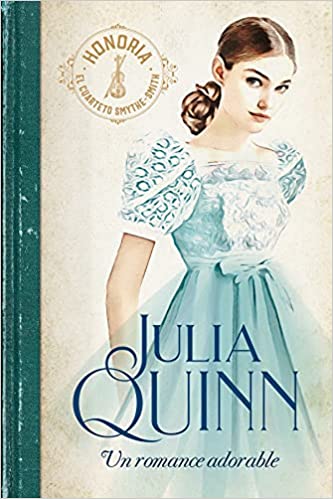
En Español
Not ready to order yours? Check out this story's overview. Read the excerpt. Listen to a bit on audio. Find out more about the series. There’s so much to love!






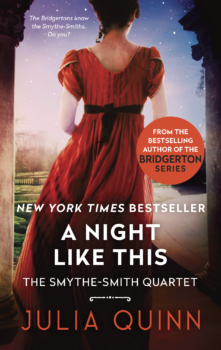
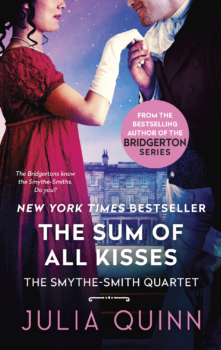





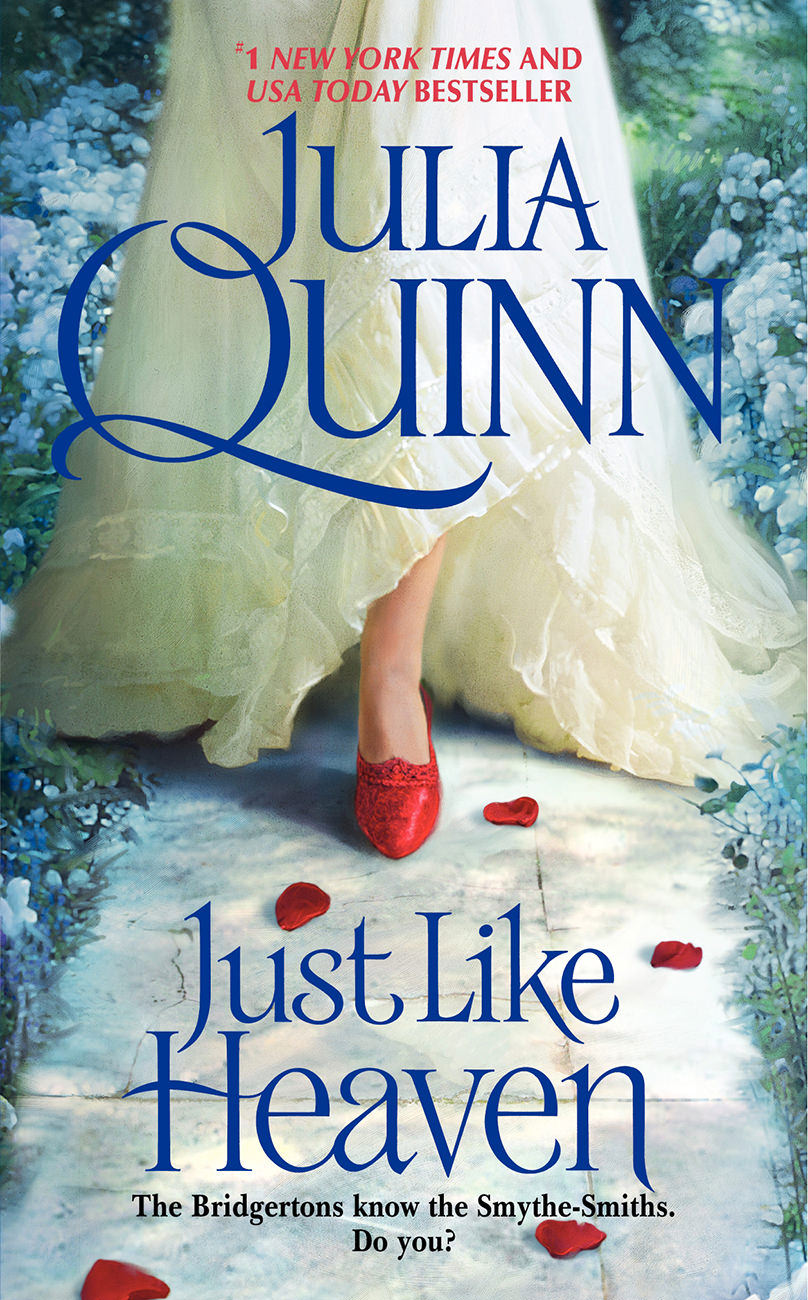

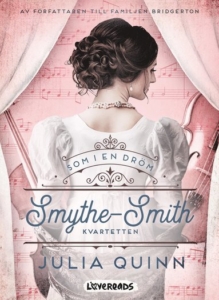


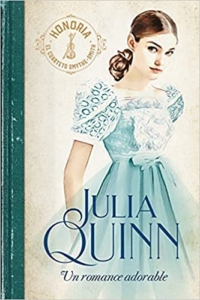


 Just Like Heaven debuted at #2 on the New York Times bestseller list for the week of June 9, 2011.
Just Like Heaven debuted at #2 on the New York Times bestseller list for the week of June 9, 2011. 

